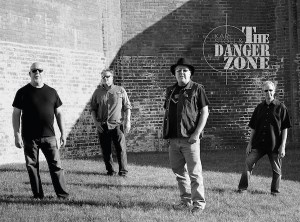
Karl Stoll and The Danger Zone Rock The Workhouse
The Workhouse, Karl Stoll and the Danger Zone’s second album, officially released on February 18, to an appreciative and loyal crowd at DC local treasure, JV’s, provides a perfect metaphor. At the height of the pandemic, during Stoll’s daily diversionary walks along the Gerry Connolly Cross County Trail, he discovered The Workhouse, once a Roosevelt-era attempt at penal reform, but today reimagined into a thriving community cultural arts center.
The Workhouse’s quad of original prison buildings, built by the inmates themselves from bricks baked in an on-site kiln, remain, but art galleries, music halls, and dance studios now inhabit those spaces. From the historical backdrop of what, ultimately, became punitive and repressive incarceration—including the reprehensible detention and mistreatment of peaceful Suffragists– a collective of innovative, creative, and free expression has emerged.
Similarly, Karl Stoll and the Danger Zone have transcended the loneliness and dis-ease of lockdown to produce an energetic, celebratory, and immensely danceable trajectory through musical genre, from blues to soul to distinctive decades of rock and roll. The Workhouse proposes a counter narrative to pandemic fatigue and pervasive uncertainty, and, in so doing, tells an essential story, in which the human spirit finds agency over the human condition.
And, in many ways, this has always been the artist’s mandate, to extract hope from the proverbial rubble. Stoll (guitar and vocals) and his Danger Zone, a trio of well-seasoned talent (Dean Dalton on bass, Brian Alpert on drums, and John “Mojo” Dickson on harmonica) collaborate with an impressive cast of musicians, including keyboardists Tommy Lepson and Shep Williams, pianist David Torkanowsky, bassist Steven Wolf, trumpetist Joe Brotherton, Saxophonist Megan Nortrup, trombonist Davis Sager, slide guitarist Paul Bell, and percussionists Josh Howell and Jordan Stoll to offer an album that, as Stoll says, “the world needs to hear right now.” He is right. There is an infectious energy throughout The Workhouse, a sense of community and purpose and fun, that offers spiritual sustenance and necessary joy.
The Workhouse’s opening track, “Meet Me in New Orleans,” a raucous, rocking celebration of NOLA funk, is an invitation to such joy, and incorporates the multi and varied talents of its players. From the intro’s seductive percussion, which continues and delights throughout, to the explosive horn play and exuberant piano, the party is a promise of “good times,” “good gumbo,” and the genius of the late, great “Dr. John.” Everyday reality may demand a more rigorous grappling, but here, “everything is fine.”
Fast forward to the haunting Delta blues of the album’s title track, “The Workhouse,” its bruised soul breathed to life through John Dickson’s inspired harmonica, and the juxtaposition is jarring. Both tracks are representative of the reality of living; there is no perfect antidote, only an amalgam of surrender, celebration, and song.
Of the eleven tracks on The Workhouse, all but one was written by Stoll. “Great Rain,” by the extraordinary John Prine (with Mike Campbell), is a cover, made especially poignant by the fact that Prine was an early casualty of COVID-19. In a fitting tribute to a fallen music hero, Stoll’s version is almost defiant, bold, the full force of his exceptional talent on the guitar, incarnating rock and roll innovators, such as Jimi Hendrix, throughout this spirited rendition.
I am aware of an almost palpable confidence as I listen to The Workhouse. Years of stage performances in venues across Delaware, Maryland and Virginia; and the fact that The Danger Zone’s first album, Take a Ride, was honored with a nomination as Best Blues Recording by Washington Area Music Association, have, no doubt, allowed the band’s vision to crystallize.
Finally, The Workhouse is “a love letter written to anyone who means anything to me,” Stoll muses, towards the end of our interview. Tracks like “He’s My Dad,” and my favorite, “Sometimes,” an Americana meditation on the vagaries of true love, which appears on the album twice, a complete version, and then revisited in a brief reprisal at the album’s close, reveal the accuracy of that sentiment.
While an eerily intact trio of guard towers still stands like immutable sentries on the periphery of The Workhouse Arts Center’s main quad, that presence simply signifies the constancy of change. Hearts break, viruses mutate, people pass on to new places and/or incarnations. Confinement–whether behind a prison gate, within our own homes, or because of the habits of our hearts and the thoughts in our minds—is real…but so is determination, resilience, and grit. Karl Stoll and the Danger Zone’s superb album, The Workhouse, recognizes these truths, yet, still, we are graced with the power to love, and, of course, to dance.
